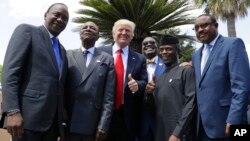ມື້ທີ 2 ແລະກໍເປັນມື້ສຸດທ້າຍ ຂອງກອງປະຊຸມສຸດຍອດປະຈຳປີ ກຸ່ມ 7 ປະເທດທີ່ຈະ
ເລີນທາງດ້ານອຸດສາຫະກຳແລະນຳໜ້າໃນດ້ານປະຊາທິປະໄຕຂອງໂລກ ກຳລັງດຳ
ເນີນຢູ່ ທີ່ເມືອງຕາອໍມີນາ ປະເທດອີຕາລີ ໂດຍມີພວກຜູ້ນຳຂອງອາຟຣິກາຫຼາຍໆປະ
ເທດ ໄດ້ເຂົ້າຮ່ວມການເຈລະຈານຳ.
ອີຕາລີ ຊຶ່ງເປັນປະເທດເຈົ້າພາບ ຢາກດຶງດູດເອົາຄວາມສົນໃຈ ໄປໃສ່ວິກິດການອົບ
ພະຍົບແລະອັນຕະລາຍໃນການຂ້າມທະເລເມດີແຕເຣນຽນໂດຍຫຼາຍສິບພັນທີ່ຊອກ
ສະແຫວງຫາຊີວິດການເປັນຢູ່ທີ່ດີຂຶ້ນໃນຢູໂຣບ.
ພວກຜູ້ນຳຈາກເອທິໂອເປຍ ເຄັນຢາ ນິແຊ ໄນຈີເຣຍແລະຕູນີເຊຍໄດ້ເຂົ້າຮ່ວມການ
ເຈລະຈາ ໃນວັນເສົາມື້ີ້ນີ້ ໃນຖະນະທີ່ປະເທດເຫຼົ່ານີ້ ແມ່ນເປັນທີ່ມາຕົ້ນຕໍຫລັກຂອງ
ພວກອົບພະຍົບທີ່ພະຍາຍາມເດີນທາງໄປຢູໂຣບ.
ການປ່ຽນແປງຂອງດິນຟ້າອາກາດ ແມ່ນຫົວຂໍ້ທີ່ມີການຖົກຖຽງກັນຢ່າງດຸເດືອດ ໃນ
ວັນສຸກວານນີ້ທີ່ກອງປະຊຸມສຸດຍອດຂອງກຸ່ມ ຈີ 7 ຢູ່ເກາະຊີຊີລີ ແຕ່ເຈົ້າໜ້າທີ່ຂອງ
ລັດຖະບານສະຫະລັດ ແລະອັງກິດ ຕ່າງກໍໄດ້ປະຕິເສດວ່າ ບໍ່ໄດ້ມີການຂັດແຍ້ງກັນ
ໃດໆເກີດຂຶ້ນ.
ພວກຜູ້ນຳ ກ່າວວ່າ ໄດ້ມີການໂອ້ລົມກັນ ທີ່ດີຫລາຍ ກ່ຽວກັບບັນຫາການປ່ຽນແປງຂອງ
ດິນຟ້າອາກາດ ຊຶ່ງນາຍົກລັດຖະມົນຕີ ເທຣີຊາ ເມ ແຫ່ງອັງກິດກ່າວຕໍ່ພວກນັກຂ່າວຕື່ມ
ວ່າ ບໍ່ມີຄວາມສົງໄສໃດໆເລີຍຢູ່ອ້ອມໂຕະເຈລະຈາ ຊຶ່ງຮວມທັງ ປະທານາທິບໍດີດໍໂນລ
ທຣຳ ແຫ່ງສະຫະລັດ ກ່ຽວກັບວ່າ ບັນຫານີ້ມີຄວາມສຳຄັນແບບໃດ.
ອີງຕາມ Gary Cohn ຫົວໜ້າທີ່ປຶກສາດ້ານເສດຖະກິດຂອງປະທານາທິບໍດີແລ້ວທ່ານ
ທຣຳໄດ້ຮັບເອົາໃນສິ່ງທີ່ທ່ານໄດ້ຮຽນຮູ້ຈາກພວກຜູ້ນຳຂອງໂລກໃນມື້ນີ້ ເພື່ອເຮັດການ
ຕັດສິນໃຈຂອງທ່ານ ກ່ຽວກັບວ່າ ວໍຊິງຕັນຈະປະຕິບັດຕາມ ຄວາມໝັ້ນໝາຍຂອງຕົນຫຼື
ບໍ່ທີ່ຈະຕັດການປ່ອຍແກັສເຮືອນແກ້ວພາຍໃຕ້ຂໍ້ຕົກລົງປາຣີທີ່ເຊັນກັນເມື່ີອສອງປີກ່ອນ
ນັ້ນ.
ເຈົ້າໜ້າທີ່ລັດຖະບານສະຫະລັດກ່າວວ່າ ທ່ານທຣຳ ທີ່ກ່າວເຖິງສະພາບອາກາດຮ້ອນ
ເອົ້າຂຶ້ນຂອງໂລກ ທີ່ມະນຸດເປັນຄົນເຮັດຂຶ້ນນັ້ນວ່າ ເປັນເລື່ອງຕະຫລົກຫຼອກລວງ ໃນ
ລະຫວ່າງການໂຄສະນາຫາສຽງເລືອກຕັ້ງປະທານາທິບໍດີ ທີ່ປະສົບກັບຄວາມສຳເລັດ
ຂອງທ່ານໃນປີກາຍນີ້ ຈະລໍຖ້າຈົນກວ່າກອງປະຊຸມສຸດຍອດ ຜ່ານພົ້ນໄປ ຈຶ່ງຈະເຮັດ
ການຕັດສິນໃຈກ່ຽວກັບເລື່ອງນີ້.
ກຸ່ມຈີ 7 ຢ້ອນຄືນຫລັງໄປເມື່ອນຶ່ງທົດສະວັດກວ່າໆ ໄດ້ຮັບຮູ້ຊ້ຳແລ້ວຊ້ຳອີກເຖິງໄພຂົ່ມ
ຂູ່ຈາກການປ່ຽນແປງຂອງດິນຟ້າອາກາດ.
The second and final day of the Group of Seven (G-7) leading democracies annual summit is under way in Taormina, Italy, with several African heads of state joining the talks.
Host Italy wants to draw attention to the migration crisis and the dangerous Mediterranean crossings taken by tens of thousands of people looking for a better life in Europe.
Leaders from Ethiopia, Kenya, Niger, Nigeria and Tunisia are involved in Saturday's talks, as those are the main countries of origin for migrants trying to reach Europe.
Climate change was among the most contentious agenda items Friday at the G-7 summit in Sicily, but both American and British government officials have publicly denied any major discord.
The leaders had a "very good discussion" about climate issues, British Prime Minister Theresa May told reporters, adding there was "no doubt around the table" -- which included U.S. President Donald Trump -- about how important the issue is.
Trump "is taking in what he learned from world leaders today" to make his decision on whether to honor Washington's commitment to cut greenhouse gas emissions under the Paris Agreement signed two years ago, according to the president's chief economic advisor, Gary Cohn.
U.S. administration officials have said Trump, who referred to man-made global warming as a "hoax" during his successful presidential campaign last year, would wait until after the summit before making a decision on the issue.
The G-7, going back more than a decade, has repeatedly recognized the threat of climate change. Closely watched will be the specific language issued about the subject in the Taormina communique, expected to be released late Friday or early Saturday.
"It would be extremely rare for this major set of developed countries to not send a clear signal regarding climate change," according to Jake Schmidt, the international program director of the National Resources Defense Council.
"We think the Paris Agreement has to be implemented entirely," said European Commission President Jean-Claude Juncker.
Sitting alongside Japanese Prime Minister Shinzo Abe, Trump said just before the start of Friday's summit that it would have a "particular focus on the North Korea problem."
A White House statement issued Friday said the two leaders have reaffirmed their commitment "to cooperate to the fullest extent possible to counter terrorist threats" and have agreed to "enhance sanctions on North Korea" in an attempt to deter the development of North Korea's ballistic missile and nuclear programs.
While terrorism would also be a primary concern for the leaders during their two days of talks on the Italian island, North Korea's nuclear weapons testing and ballistic missile development comprise "a big problem, it's a world problem," said Trump. "It will be solved at some point. It will be solved, you can bet on that."
Trade is another major topic on the minds of Trump's counterparts, who have gathered in the resort town of Taormina.
Juncker, who heads the 28-member EC which manages the day-to-day business of the European Union, on Friday denied that Trump in a closed-door meeting in Brussels the previous day denounced Germany as "very bad" for its trade policies.
"He did not say that the Germans were behaving badly," Juncker said, adding German reports are not true that the U.S. president had been aggressive toward Germany.
Cohn, briefing reporters alongside H.R. McMcaster, the national security advisor, clarified earlier remarks that a softening of sanctions in place on Moscow might be softened.
"We're not lowering our sanctions on Russia. If anything we would look to get tougher on Russia," said Cohn, who is the director of the national economic council.
Along with the United States, the other members of the G-7 are Canada, France, Germany, Italy, Japan and Britain. The EU is also represented.
The group of wealthy nations also included Russia between 1997 and 2014 and was known as the G-8. But after Moscow's invasion of Crimea, Russian participation was suspended.
For Russia to return it would have to adhere to the "Minsk accords, and implementing those, restoring Ukrainian sovereignty," U.S. Secretary of State Rex Tillerson told reporters Wednesday.






